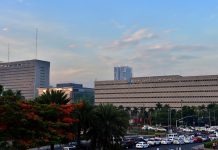An International Monetary Fund (IMF) mission team that visited the Philippines from Feb. 20-24, 2017 found the country’s monetary policy supportive of domestic expansion, with the latter forecasts to average at 6.8 percent for 2017.
In a statement Friday, the IMF said the mission team, led by Luis E. Breuer, found that the Interest Rate Corridor (IRC), which the Bangko Sentral ng Pilipinas (BSP) implemented since June 2016, “has strengthened monetary transmission.”
The auction- and information technology-based IRC is aimed at further strengthening the relationship between the central bank’s policy rates and money market interest rates as well as better manage inflation and promote long-term sustainable expansion of the economy.
With its implementation, the policy-making Monetary Board (MB) cut the BSP’s overnight lending or repurchase (RP) rate to 3.5 percent from six percent and the overnight borrowing or reverse repurchase (RRP) rate to three percent from four percent.
The 2.5 percent rate of the special deposit account (SDA) facility was kept.
The RRP serves as the IRC’s key rate, the RP rate is the ceiling rate and the SDA is the floor rate.
The IMF mission team also said the central bank had appropriately allowed the exemptions on the single borrower’s limit to lapse, which reduces concentration risks in the banking sector.”
The single borrower’s limit (SBL) was approved for a three-year implementation starting in 2010 but was extended for another three years to ensure fund sources for projects included in the public-private partnership (PPP) initiative.
However, the BSP’s MB decided to let the extension lapse by Dec. 28, 2016 after noting that “there are sufficient feasible funding alternatives already available to PPP project proponents” such as entry of more foreign banks.
The IMF team also supported the approval of the first package of the Duterte government’s proposed comprehensive tax reform program (CTRP), noting that this is “critical to sustain the rise in expenditures targeted in the medium term fiscal framework, which is anchored on a three percent GDP (gross domestic product) deficit.”
“Fiscal policy is appropriately focused on the medium term objectives of addressing the infrastructure gap and inequalities and should be supported by public financial management reforms,” it said.
It pointed out that “over the medium term, a continuation of sound macroeconomic policies and structural reforms would be important to sustain investor confidence and make growth more inclusive.”
“Key reforms include those aimed at raising productive investment, opening up the economy to greater competition and foreign investments, and reducing poverty such as by removing the quantitative restrictions on rice imports,” it said.
The next IMF team is expected to visit the Philippines by midyear for the Article IV consultation. (PNA)






